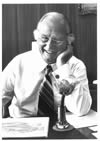



Provenance
1 - Alfred Dunbavin Butcher
1 - Alfred Dunbavin Butcher
|
Home Provenance Series List Index Search |
| Date Range | 3 June 1915 - 28 May 1990 | ||||||||||||||||||||||||||||||||||
| Details Born in Hamilton, Victoria, Alfred Dunbavin Butcher was educated at the University of Melbourne where he graduated BSc and MSc. In 1941, he joined the department as a biologist and soon after became Chief Inspector. His elevation as Director was not, however, without teething difficulties. The division included only 14 field operatives concerned with fish and law enforcement and their working conditions were primitive and rudimentary. Butcher had no laboratory assistant, no private transport and his working desk consisted of a gouged wooden kitchen sink and bench, without hot water. The meagre tools available to him included a dissecting kit from his postgraduate years and a marine water sampler which had seen better days as a fire extinguisher. Later in life, Butcher admitted it was "a tough apprenticeship", yet he developed from a closeted and intense research biologist into an experienced "scientific jack-of-all-trades". Despite these conditions, Butcher proved a resourceful and imaginative operator. After WWII, he played a leading role in negotiating informal relations between the States and the Commonwealth in fisheries management matters which led to the creation of the Australian Fisheries Council. Throughout his career, Butcher promoted conservation based on ecological principles and was instrumental in urging government action on key issues such as the Enquiry into Pesticides. Indeed, he never ceased to maintain his concern for applied biology, particularly in the areas where government policy and environment protection became increasingly imperative. At the age of 33, Alf Butcher's training and ideas found full expression when he was promoted as Director of the Fisheries and Wildlife Branch of the Victorian Chief Secretary's Department in 1949. As the country's first scientifically trained State department head, it was an inspired appointment. Under Butcher’s direction the ethos of the Fisheries Department changed, moving from a concern almost exclusively restricted to the activities of hunting and angling to the whole gamut of ecologically based issues: pesticides, land degradation, global pollution, planning,dustrial development and waste management. The department also expanded and became a multi-faceted research and administration organisation which encompassed a freshwater fisheries laboratory at Snob's Creek and the Arthur Rylah Institute of Environmental Research. During this transformation, Butcher obstructed numerous attempts to divide and "rationalise" the department. Consequently it remains one of the two in Australia to combine fisheries and wildlife management. Never restrained by the demands of his office, Butcher wrote prolifically, visited nature conservation agencies, presented conference papers and observed wildlife management techniques in situ. He also directed his prodigious energy towards the governance of numerous trusts and boards. However, it is for his association with the Royal Melbourne Zoological Gardens that Alf Butcher may best be remembered. In 1947 he became a member of the Zoological Board of Victoria and in 1962 he was elected its Chairman. Before Butcher’s ascendancy, the Melbourne Zoo had for decades suffered neglect under successive state governments, precarious financial support, inadequate enclosures and a disinterested public. The zoo Butcher encountered in 1962 was a "miserable place" of box-like concrete pits and heavy iron bars. Reflecting changing public attitudes, Butcher observed that "people will no longer tolerate the old zoo - its finished". Three years later he propelled the "cage people not animals" program, replacing the antiquated cages with grass, rocky outcrops, moats and viewing glass surrounded by landscaped gardens. In his capacity as Chairman, Butcher instigated profound changes, notably the modernization of the animal enclosures and the introduction of an unorthodox zoo education service with a strong emphasis on conservation and research programs. "We should be teaching children how they fit into the world", he once remarked. When asked to consider his greatest achievement, Butcher named the butterfly enclosure, housed in a Queensland tropical rainforest and opened in 1985. However, there were other considerable developments including the Lion Park, the Great Flight Aviary and the Aboreal Primates display. As Chairman, Butcher also oversaw the management and the redevelopment of the Healesville Sanctuary and the creation of the Werribee Zoological Park. From modest beginnings in a once marginal and neglected government department, his legacy is an enduring one. Alf Butcher became one of the most crucial figures in wildlife management and environment assessment. This entry was quoted verbatim (with permission from the author) from: Anderson, Fay, 'A.D. Butcher: A Man for all Seasons', Australasian Science, vol. 19, no. 4, 1998, p. 56. | |||||||||||||||||||||||||||||||||||
| Chronology | |||||||||||||||||||||||||||||||||||
| |||||||||||||||||||||||||||||||||||
| References | Byrne, Jennifer, 1978, ‘Dunbavin Butcher quits the wild life’, Age, 23 February, Records of A.D. Butcher, ASAP. De Courcy, Catherine, 1995, The Zoo Story, Penguin Books, Melbourne. Gilmartin, Malvern, 1978, ‘Former Deputy of Conservation looks back on 26 years’ association with fisheries’, Australian Fisheries, June, Records of A.D. Butcher, ASAP. Biographical Notes, 089, Records of A.D. Butcher, ASAP. Speech commemorating Alfred Dunbavin Butcher’s admission to the degree of Doctor of Science, August 1986, Records of A.D. Butcher, ASAP. | ||||||||||||||||||||||||||||||||||
|
Published by the The University of Melbourne eScholarship Research Centre on AustehcWeb, July 2004
ISBN 978-0-7340-4135-7 Listed by Andrea Barnes, Gavan McCarthy, Ann McCarthy and Rachel Tropea HTML edition Ann McCarthy and Rachel Tropea Updated 3 August 2020 http://www.austehc.unimelb.edu.au/guides/butc/BUTP001.htm The template for this finding aid is part of the Heritage Documentation Management System |
[ Top of Page | Home | Series | Provenance | Search | Index ] |